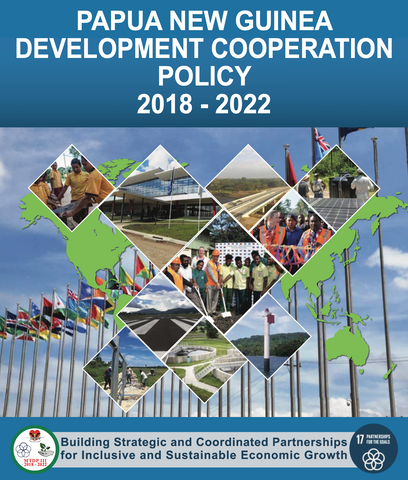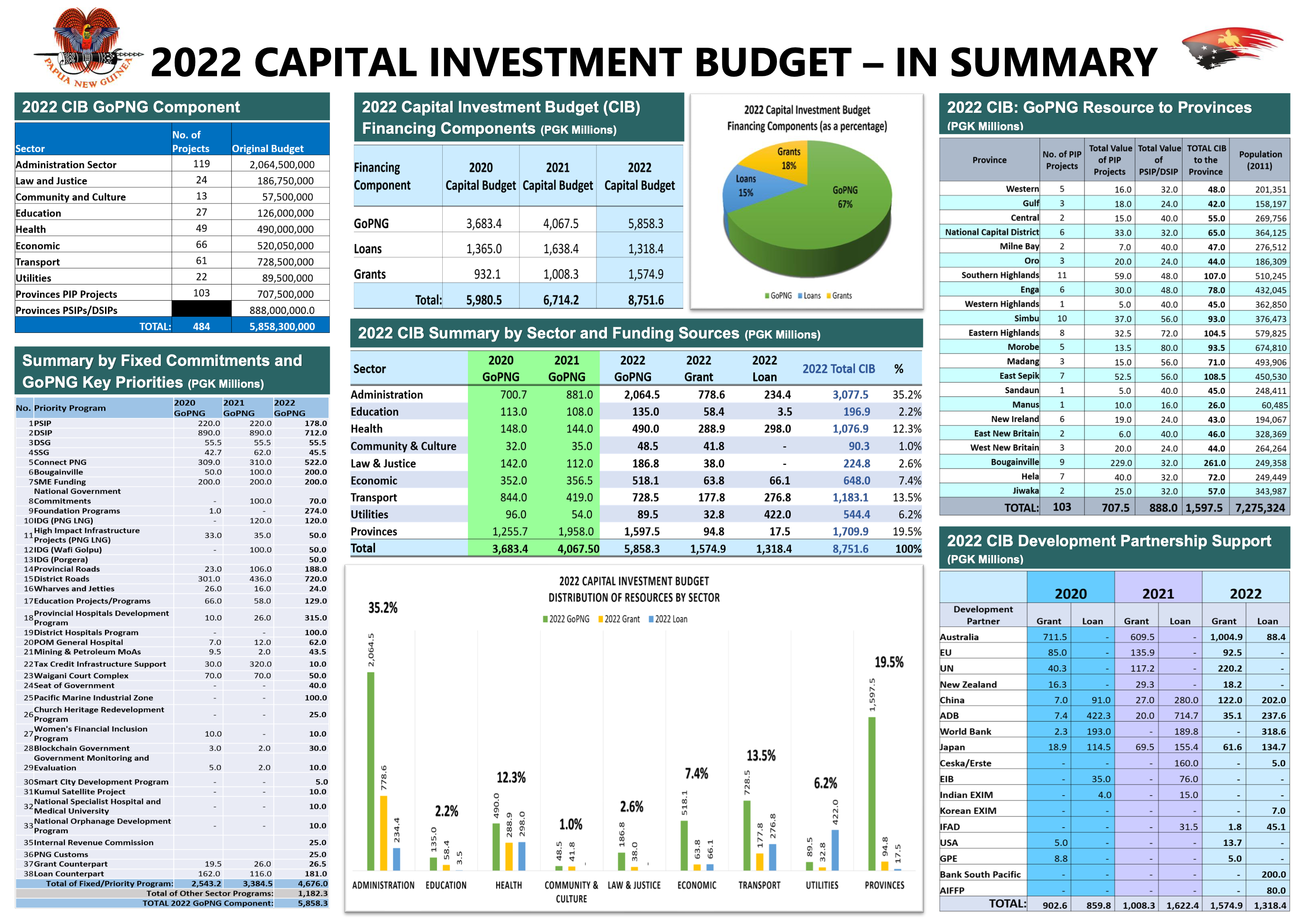Development Cooperation Policy 2018-2022
Development Cooperation has been an essential part of Papua New Guinea (PNG)'s (PNG) overall development efforts prior to achieving political independence in 1975. Overtime, PNG has evolved from a heavily aid-dependent nation to implement its development plans and budgets to a country now engaging in more strategic and coordinated partnerships. This reflects a changing approach to how PNG is applying development cooperation resources as it moves from aid dependence to strategic economic cooperation.
It was in 2015 that PNG's inaugural Development Cooperation Policy (DCP) was established as a policy framework to effectively and efficiently guide GoPNG in mobilising, coordinating, managing and delivering development cooperation resources as an important element to implementing its development strategies and plans. It also served as a framework for all Development Partners (DPs), for effective development cooperation partnerships with GoPNG.
In 2018, a review of the Policy became necessary because of the changing development cooperation landscape globally and in PNG, as non-traditional DPs, (including private sector, CSOs, philanthropic foundations and non-ODA partners) continue to increase their levels of assistance towards PNG's development.
The PNG Development Cooperation Policy 2018-2022
The overarching goal of the PNG DCP 2018-2022 is to ensure that development cooperation resources make maximum contribution to the achievement of PNG's MTDP IV and supporting national, sectoral and subnational policies and plans. This will be achieved through five key inter-related objectives:
Objectives:
1. To assert Government leadership in the coordination and management of development cooperation alignment to PNG's development objectives and targets for better value of support.
2. To mobilise strategic and innovative external partnerships to promote effective and sustainable development cooperation.
3. To strengthen partnerships and coordination between Development Partners, Government and stakeholders in the delivery of development cooperation interventions.
4. To build and strengthen national capacity for the effective delivery and sustainability of development initiatives.
5. To institutionalize and coordinate PNG's regional assistance in the Region.
The PNG DCP 2018-2022 retains and emphasises 11 essential principles that all DPs, government bodies and actors in development must follow to support the achievement of the key priorities of Government. These principles are:
i. Respect and Maintain GoPNG's Integrity
ii. Alignment to GoPNG's Development Priorities
iii. Coherence with GoPNG's National Service Delivery Framework
iv. Technical Advisor Compliance with GoPNG's Regulations
v. Comparative Advantage of Development Partners
vi. Utilising GoPNG Systems and Processes
vii. Uphold Mutual Relationship Values
viii. Ensure Transparency and Accountability
ix. Prudent and Effective Mangement of Development Cooperation
x. Economic Empowerment
xi. Openness and Commitment

Development Cooperation has been an essential part of Papua New Guinea (PNG)'s (PNG) overall development efforts prior to achieving political independence in 1975. Overtime, PNG has evolved from a heavily aid-dependent nation to implement its development plans and budgets to a country now engaging in more strategic and coordinated partnerships. This reflects a changing approach to how PNG is applying development cooperation resources as it moves from aid dependence to strategic economic cooperation.
It was in 2015 that PNG's inaugural Development Cooperation Policy (DCP) was established as a policy framework to effectively and efficiently guide GoPNG in mobilising, coordinating, managing and delivering development cooperation resources as an important element to implementing its development strategies and plans. It also served as a framework for all Development Partners (DPs), for effective development cooperation partnerships with GoPNG.
In 2018, a review of the Policy became necessary because of the changing development cooperation landscape globally and in PNG, as non-traditional DPs, (including private sector, CSOs, philanthropic foundations and non-ODA partners) continue to increase their levels of assistance towards PNG's development.
The PNG Development Cooperation Policy 2018-2022
The overarching goal of the PNG DCP 2018-2022 is to ensure that development cooperation resources make maximum contribution to the achievement of PNG's MTDP IV and supporting national, sectoral and subnational policies and plans. This will be achieved through five key inter-related objectives:
Objectives:
1. To assert Government leadership in the coordination and management of development cooperation alignment to PNG's development objectives and targets for better value of support.
2. To mobilise strategic and innovative external partnerships to promote effective and sustainable development cooperation.
3. To strengthen partnerships and coordination between Development Partners, Government and stakeholders in the delivery of development cooperation interventions.
4. To build and strengthen national capacity for the effective delivery and sustainability of development initiatives.
5. To institutionalize and coordinate PNG's regional assistance in the Region.
The PNG DCP 2018-2022 retains and emphasises 11 essential principles that all DPs, government bodies and actors in development must follow to support the achievement of the key priorities of Government. These principles are:
i. Respect and Maintain GoPNG's Integrity
ii. Alignment to GoPNG's Development Priorities
iii. Coherence with GoPNG's National Service Delivery Framework
iv. Technical Advisor Compliance with GoPNG's Regulations
v. Comparative Advantage of Development Partners
vi. Utilising GoPNG Systems and Processes
vii. Uphold Mutual Relationship Values
viii. Ensure Transparency and Accountability
ix. Prudent and Effective Mangement of Development Cooperation
x. Economic Empowerment
xi. Openness and Commitment


